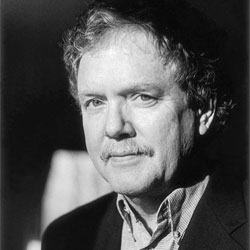I find joy in the cemetery trees.
Their roots are in our hearts.
In their leaves the soul
of another century is in ascension.
I hear the rustling of their branches
and watch the exhausted laborers
from the Burgreen Construction Company
sit down in the shade,
unwrapping their ham and salami
and popping open their thermoses.
Apparently, they too are enamored
of the hickory and willow
at the edge of our cemetery.
They are stretching twine, building a wall
as though this could be contained.
Probably they do not think
of our grandmothers who are pierced,
and probably do not want
to hear about Thomas Hardy,
who, if I remember, has been dead
longer than they have been alive,
And who gave to the leaves of one yew
the names of his own dead. Anyway
the only spirits I can call in this place
are the stench of a possum
suppurating in secret weeds
and the flies, who are marvelous
because their appetite is our revulsion.
Let the laborers go on. Right now
I wish I could admire the trees simply
for their architecture. All winter
the dying have set their tables
and now they are almost as black
as the profound waters off Guam.
A few minutes ago, when they started
in a slight breeze off the lake,
the many and patient sails,
I could see in those motions
a little of the world that owns me —
and that I cannot understand —
rise in its indifferent passion.
Notes on the Poem
What is the particular joy Rodney Jones' narrator finds in the foliage populating the graveyard? That joy is muted and bemused, but it's definitely there. In his attention to the earthly and the earthy, one might get the impression the narrator is focusing on the mundane, even the depressing. The construction workers are tired, and apparently working on a futile project. Worse, a fly-covered possum carcass is not only dominating the sensory impressions of this place, but reminding the narrator of what else is in decay in this place. But wait ... those workers are actually relaxing and refueling (rather cheerfully, punctuated by the popping of their thermoses) in the cemetery, and they share with the narrator affection and reverence for the trees. The trees offer both tangible delights and comforts, such as the pleasant rustling of their branches, and something more transcendent: "In their leaves the soul of another century is in ascension." The rustling is no doubt caused by the "slight breeze off the lake". That breeze not only likely pushed away the aforementioned unpleasant smells, but set in motion both literal sails and perhaps the sails of souls embarking on journeys that the narrator confesses "I cannot understand" ... but at the end of the poem, one is convinced the narrator has found both joy and solace.
